Starbucks Espresso Shot Can Funny Taste Something Is Not Right
Just so you know, if you click on a product on RoastyCoffee.com and decide to buy it, we may earn a small commission.
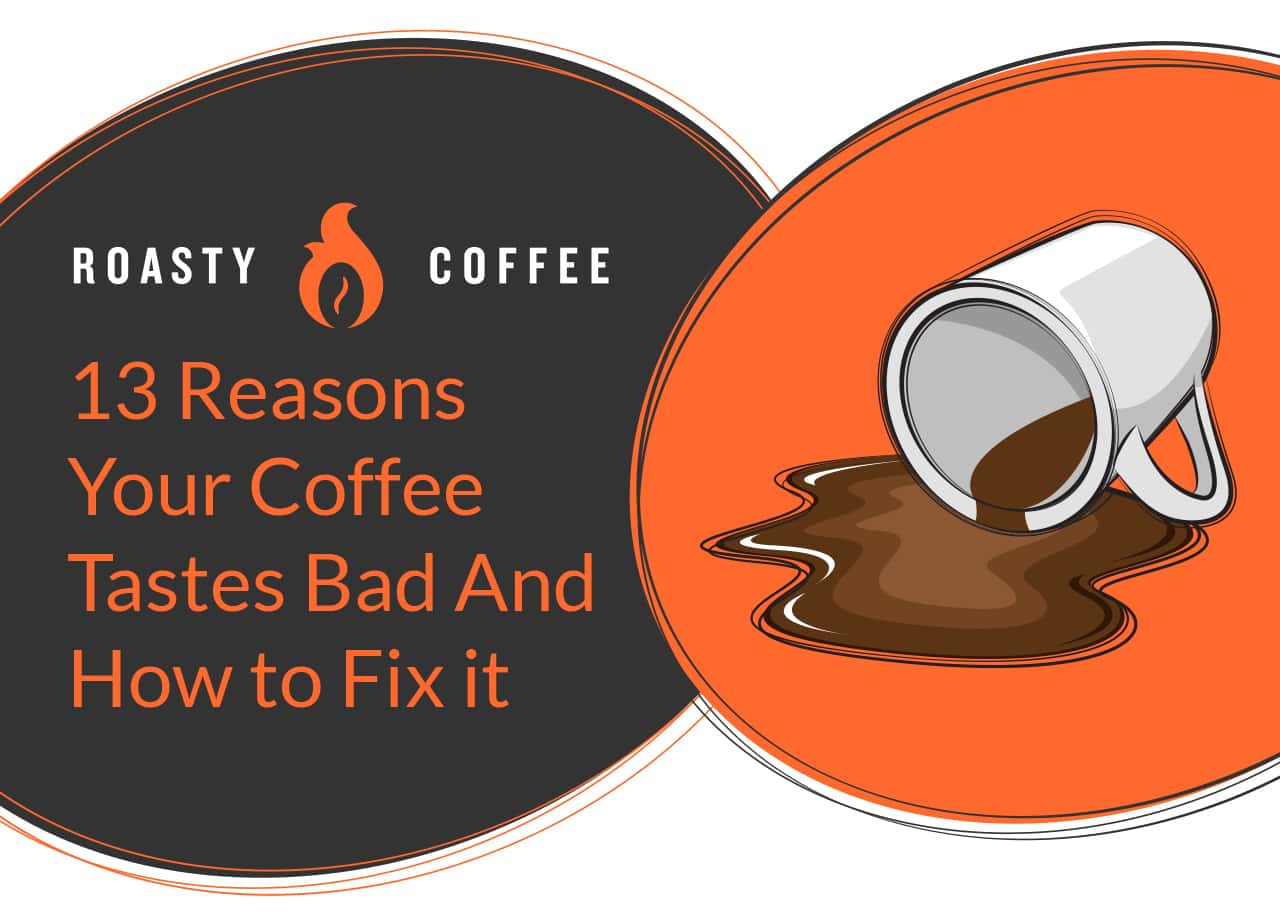
Hey, we all have off days. And sometimes those off days come in the form of coffee that tastes bad. And not bad like "you're never getting those beans again" bad, but bad like "this is my favorite coffee and something has gone horribly wrong" bad.
That's okay. It happens. And we can help you learn how to not make the same mistake again.
Brewing coffee is as much of an art as it a science. Once you know the common mistakes made with coffee beans, water, and equipment, you can correct them and get back to making great-tasting brews.
Common Coffee Conundrums
There are several reasons why your coffee isn't brewing as well as you want it to. Here's a quick overview of these reasons that we'll discuss throughout this article:
- It's the coffee beans.
- Your water quality isn't the best.
- There's a problem with your equipment.
Read on to distinguish between these common problems and accurately diagnose the issue with your coffee brewing.
The Beans are the Problem
We can never stress just how important good coffee beans are to a great cup of joe. You may already know we're huge proponents of grinding your own beans, but sometimes even good coffee beans can be one of the reasons why your coffee tastes bad.
1. Your Beans Aren't Fresh
Coffee does not have an infinite shelf life, no matter how good the beans look or how faintly they still smell. The second those little pockets of deliciousness leave the roaster, they begin to lose flavor.
Roasting produces a ton of carbon dioxide in coffee beans. They then leak carbon dioxide in a process called degassing. The longer they degas, the more flavor escapes. If your beans have been forgotten in the back of a cabinet for a year or improperly stored, it could be the reason behind your lackluster cup of coffee.
Think about it like this. For every 24 hours you leave coffee exposed to air at room temperature, it loses 10% of its shelf life. That's a ton of flavor loss. Even if it's stored properly, the constant release of gases and oxidation of the coffee oils will affect the taste.
How to Fix It: As much as it may pain you to throw away treasured beans, it's what you need to do. Try not to be a coffee hoarder and always store your beans properly. Coffee is better when it's fresh, so you want to make regular shopping trips and only buy what you need for the next week or two. And remember to look for a roast date instead of an expiration date on your coffee label.
When we say fresh, we mean between four days and two weeks old. That's because really fresh coffee is still in a major degassing phase and hasn't had enough time to develop more flavorful oils.
No products found.
2. The Roast is Bad
If you're roasting your own beans, this may be your bad coffee culprit. Roasting is a finicky process that requires consistent heat applied throughout the roast time. While you certainly can roast your own beans at home, you do need to create an environment that mimics a professional roaster's equipment.
But sometimes the quality of your roast is out of your control. Even roasters make mistakes (we're all human). And if you're getting coffee from the grocery store, there's a good chance that you're not always getting the same quality of beans.
Yeah, you read that right. An analysis of 15 store brands found their protein and sugar contents to be wildly inconsistent across brands and roasts. Essentially, even industrial coffee roasters have trouble roasting beans consistently. So don't get freaked out if you come across a bad roast.
How to Fix It: If your home roast is bad, consider finding a new recipe or checking good equipment substitutes. If your bought beans are bad, try a different batch of the same bean or switch coffee types altogether.
Remember, coffee is all about personal taste. If you keep getting disappointed by the same bean or roaster, don't be afraid to change it up. Just because a friend loves it doesn't mean you have to.

3. The Coffee is Low Quality
We all love a good deal, but short-changing your coffee bean budget can bite you in the you-know-what. Generally, robusta coffee beans are considered to be lower quality, but that designation is more about flavor than the actual quality of the bean.
Robusta coffee is less complex and flavorful than arabica coffee, so that's something to consider if you find robusta beans don't quite meet your tastes.
Outside of the variety, there's also the specific bean and roast. If you're paying for cheap coffee, there's a good chance your coffee will taste, well, cheap.
How to Fix It: It helps to know how to buy the best coffee beans. If you stay away from pre-ground coffee with vague labels, you'll have a better chance of discovering better coffee.

4. Your Grind is Too Big/Small
The grind of your beans can make a huge difference in the flavor of your coffee. Why? Well, coffee grounds need to be soluble enough to impart good flavor but insoluble enough to stay out of your filter system.
If your coffee tastes weak or sour, your drink may be under-extracted. The bad taste comes from the acids in the bean dissolving early in the brewing process. Large coffee grounds can cause this unappealing flavor since they have more surface area and don't dissolve enough during your brew.
If your coffee tastes super bitter, your drink may be over-extracted. This happens most often with too fine of a grind.
Depending on the type of coffee you're brewing, you may need to adjust the size of your grounds. How you grind coffee beans for espresso is different from your regular drip coffee.
How to Fix It: First things first, you have to know which grind goes with what brewing method. If you're making coffee with a French press, you want your coffee beans to be extremely coarse. On the opposite end of the spectrum, Turkish coffee requires beans ground as fine as powdered sugar.
Remember, grinding your own beans is the best way to ensure a great-tasting cup of joe. It might seem inconvenient if you don't have a burr grinder (it's our must-have coffee tool!), but once you have a grinder to go with your coffee gear, you'll wonder why you didn't get one sooner.
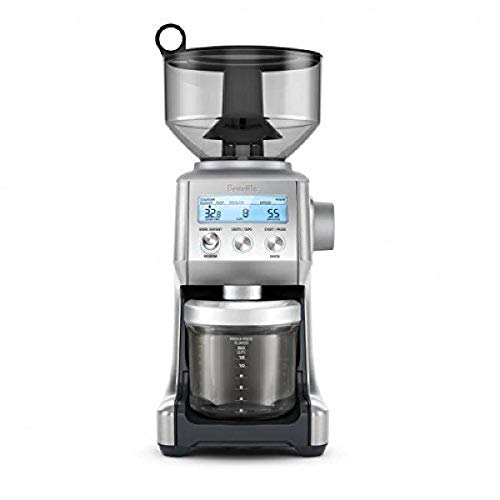
Water is the Problem
After the beans, your water could be the big reason why your coffee tastes bad. Even if you regularly drink water straight from the tap and it tastes fine to you, it may still be the problem.
5. Your Temperature is Wrong
It might seem arbitrary to the untrained eye, but we'll never get tired of championing the perfect temperature for brewing coffee. We recommend 205°F (96°C) for any cup of coffee.
Why? You want your water hot but not boiling. Too hot and you could destroy volatile oils and the subtler flavors of your beans. Too cool and your coffee will come out under-extracted… which is weak and not a great way to start your day.
How to Fix It: This one is an easy fix. Invest in a thermometer. It can be a traditional thermometer or a fancy laser one.
And if you ever find yourself without a thermometer again? Simply bring your water to a boil and remove from heat for around 30 seconds before brewing.

6. Your Tap Water isn't Great
It might taste fine to you, but particles in your tap water can have a huge impact on the flavor of your coffee. Brewing coffee is like a chemistry problem. You can throw off your equation when you introduce unknown elements.
How to Fix It: This one is another easy fix. Filter the water you use to brew your coffee. Remember, many tap water filters need to run cold for proper use.

Equipment is the Problem
So your beans and your water are both good but something's still not right. If that's the case, then your equipment may be why your coffee still tastes bad.
7. Your Equipment is Dirty
It might not feel like you need to clean it out every time—after all, you only made coffee. Just a quick rinse and it'll be fine, right?
Well, no. If you don't know how to clean a coffee maker, now's the time to learn. That's because we tend to only think about the coffee pot and the filter area.
Just when was the last time you cleaned the reservoir of your drip coffee maker? If you don't remember, it might be time to do a proper wash of your coffee gear.
How to Fix It: Properly clean your coffee maker. Your taste buds and your immune system will thank you.

8. Your Equipment is Old
Sure, your coffee pot has been with you through thick and thin. It brought you a little cup of happiness on even the worst days. But no one and nothing is immune to the perils of age.
This is especially true if the quality of your coffee takes a nosedive for no apparent reason. Your beans are good, your water is filtered and heated properly, and your equipment is recently cleaned. If that's the coffee mystery you have on your hands, you may need a new machine.
How to Fix It: There's not much you can do if your equipment is starting to break down. Start looking for a new coffee maker or grinder, stat.

9. You Used the Wrong Equipment
Sometimes we can get away with fudging our coffee gear. Making espresso without an espresso machine can produce great results… just not with the consistency and accuracy of an actual machine.
We wholeheartedly encourage you to look for workarounds (especially if you're on a budget) but you might be at the point in your coffee exploration where an expensive machine makes sense.
Another thing to watch out for is what you're actually drinking your coffee from. We highly doubt you're going to reach for a plastic cup when you want to pour your coffee, but just in case: don't. Glass and ceramic mugs are best when you're at home, while stainless steel travel mugs are best when you're on the go.
How to Fix It: Try using the proper equipment for the type of coffee you want to make.
On Sale

Something Else Went Wrong
So your beans, water, and equipment aren't the problem. That's okay. Brewing coffee can be tricky, so there could be other reasons why your coffee tastes bad.
10. Your Timing is Off
If you drink herbal tea, you might not care if it steeps a little longer than you mean to. That's not how things work with coffee. If your brew runs too short or too long, you may have over or under-extracted coffee on your hands.
For example, you can brew percolated coffee between six and ten minutes. That's a huge time variable. If you're trying a new recipe, a little experimentation may be necessary to find the best way to brew.
How to Fix It: Slowly adjust your timing to find what tastes best to you.
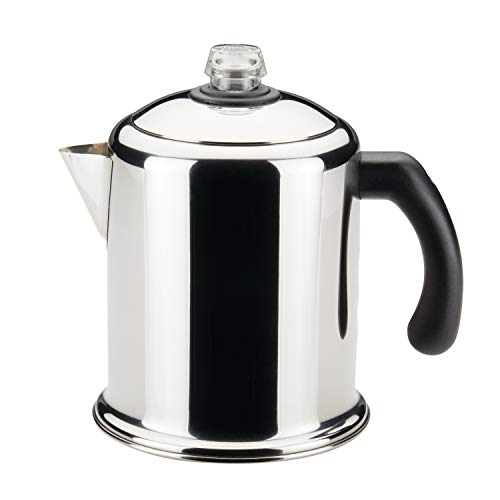
11. You're Brewing Too Much Coffee
Just like buying coffee beans in bulk, brewing coffee in bulk isn't a great idea either. It may seem like it'll save you time later, but coffee is best when it's fresh out of the pot.
How to Fix It: Brew less coffee more often, especially when you're at home. If you brew for exactly what you (or your guests) are going to drink, you'll always have a fresh cup of coffee on hand.
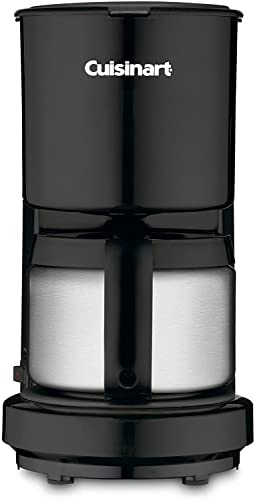
12. You Made a Mistake
Hey, it happens to the best of us. If you know what went wrong, great. If you don't, think back over your brewing process. Maybe you didn't measure the water correctly. Maybe you missed a step somewhere. It's fine if you don't remember where it could have gone wrong.
How to Fix It: Remember to take notes the next time you try that same brew. Write down every step, how much water and grounds you used, and even the temperature of the water. If the coffee tastes bad on the second test, start making adjustments until you suss out the problem.

13. You Don't Even Like That Kind of Coffee
Remember, coffee is all about your personal tastes. Don't force yourself to drink coffee that tastes bad to you.
How to Fix It: Change the recipe, try different beans, and discover what you enjoy.
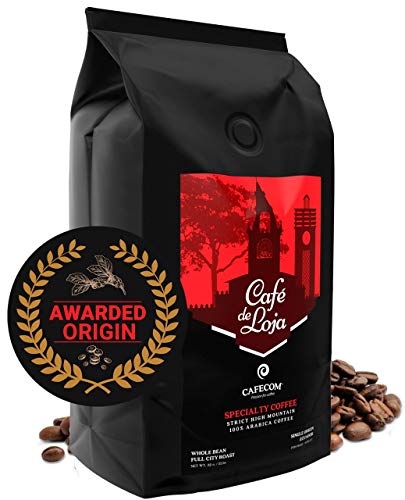
What If My Coffee Tastes…
The temperature of the water can severely affect the brewing process. However, other factors may cause a disruption of flavor in your coffee.
If you've kept your equipment clean and your coffee beans are fresh, but there's still some funky flavor happening, there could be other factors causing problems.
Bitter?
If you brew with water that's too hot, your coffee can end up tasting bitter. Other factors like stale beans, brewing for too long, or a too-fine grind can also create a bitter flavor.
Some tips to fix this are adding milk/sugar to the coffee, or even adding a tiny amount of salt to bring out the coffee's natural flavor.
Sour?
In comparison to bitter coffee, a sour coffee flavor is on the opposite end of the spectrum. A sour flavor is often caused by the under-extraction of coffee. When you don't brew coffee long enough or the grounds are too large, this can easily occur. A quick fix for this is brewing your coffee for a little longer or adjusting your grind size to be a little finer.
Burnt?
A burnt flavor normally occurs if the beans are overroasted (which happens before you even buy the grounds–so that's probably unlikely), or if you overcook the coffee. This can also occur if you brew your coffee with too-hoot water for too long. After you brew, it's ideal to keep your coffee aswarmas possible. Keeping it piping hot is only going to kill the flavor.
Metallic?
If it's not caused by build-up in your machine, this phenomenon is often caused by a problem with water flavor/quality.
For those who brew with regular tap water, this problem can be a common occurrence. There can be traces of chlorine and other contaminants in tap water that alter the flavor of the water, so brewing with filtered or bottled water is the best option.
Watery?
Watered-down coffee is no fun and can be caused by a variety of factors. These factors include not using enough coffee to brew, not brewing for long enough, not brewing hot enough, or using a too-small grind size. To tackle this, start by adjusting your coffee/water ratio. Then you can check your brewing time, grind size, and water temperature.
Like Plastic?
If your coffee has a plastic taste, and the problem isn't your water or brewing method, it's probably your machine. Machines can cause this plastic-flavor phenomenon when they're new, or when they've been overused and not given a good clean now and then.
The most successful solution is deep cleaning your machine. Begin by washing your water reservoir (since these are normally plastic) and running a brew cycle with hot water. You can even run a cleaning brew cycle with 50/50 white vinegar and water, 50/50 baking soda/water, or 50/50 lemon juice and water.
Now You (Probably) Know Why Your Coffee Tastes Bad
So you might find it a little easier to get a great cup of coffee again in your kitchen. Of course, some coffee conundrums go beyond these thirteen common problems. If that's the case, don't worry.
Think back on your brew process, inspect your beans, or maybe look at getting new equipment. Change one variable at a time until you get to the bottom of your coffee problem.
It takes work to become an expert home barista, but with a little practice and tenacity when things go wrong, you'll get the hang of it soon.
Happy Caffeinating!
Share the goods

Make every day delicious
Sign up for a free newsletter to help you brew amazing coffee at home.

Brew like a Barista
from home
The Home Barista Coffee Course 14-lesson video course about brewing consistently amazing coffee at home. Stream or download the entire course to learn how to make coffee as good as your local barista for a fraction of the cost.
Learn more
Source: https://www.roastycoffee.com/coffee-tastes-bad/
0 Response to "Starbucks Espresso Shot Can Funny Taste Something Is Not Right"
Enregistrer un commentaire